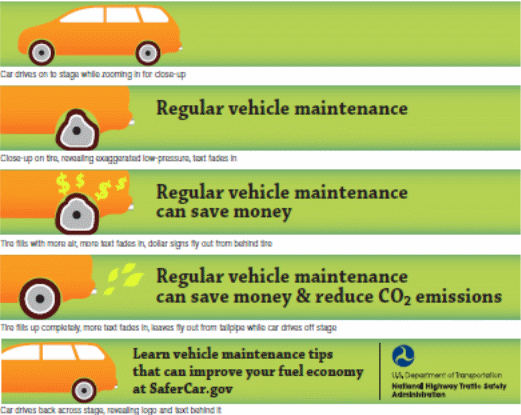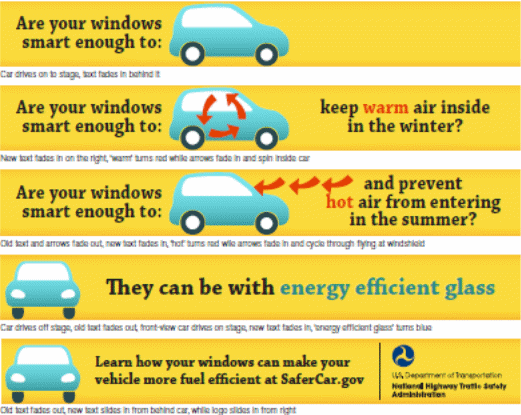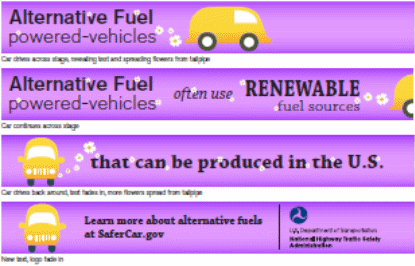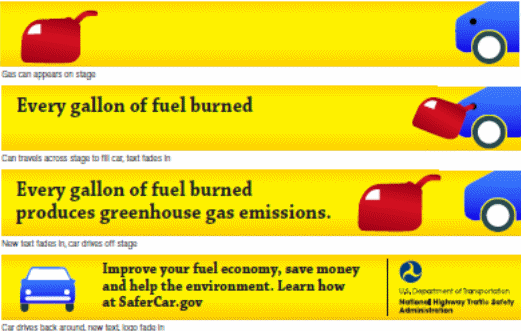Form NHTSA Form 1160 NHTSA Form 1160 Fuel Economy, GHG, Other Emmissions, and Alternative Fue
Supporting Statement for Fuel Economy, GHG, Other Emissions, and Alternative Fuels Education Program Quantitative Research Plan
Appendix D - Quantitative Survey_ rev 012712
Supporting Statement for Fuel Economy, GHG, Other Emissions, and Alternative Fuels Education Program Quantitative Research Plan
OMB: 2127-0681
OMB Control No. 2127-xxxx
Expiration Date xx/xx/xxxx
Appendix D:
Fuel Economy, GHG, Other Emissions, and Alternative Fuels Education Program
Quantitative Survey
January 27, 2012
Target Audience: U.S. drivers ages 18 and older who currently own or lease a vehicle and are the primary or a shared decision maker on vehicle purchases for their household.
Length of Interview: 20 minutes
Data Collection Mode: Online Survey
Data Collection Dates: TBD (Dependent on OMB approval date)
A federal agency may not conduct or sponsor, and a person is not required to respond to, nor shall a person be subject to a penalty for failure to comply with a collection of information subject to the requirements of the Paperwork Reduction Act unless that collection of information displays a current valid OMB Control Number. The OMB Control Number for this information collection is 2127-XXXX. Public reporting for this collection of information is estimated to be approximately 20 minutes per response, including the time for reviewing instructions, completing and reviewing the collection of information. All responses to this collection of information are voluntary. Send comments regarding this burden estimate or any other aspect of this collection of information, including suggestions for reducing this burden to: Information Collection Clearance Officer, National Highway Traffic Safety Administration, 1200 New Jersey Ave, S.E., Washington, DC, 20590
Research Objectives:
Test consumer comprehension of existing fuel economy-related content1. The research will explore:
Among consumers, what is the existing level of knowledge regarding fuel economy and where did consumers obtain the information they already have?
What knowledge gaps are important to address through NHTSA’s consumer education program?
In terms of fuel economy, GHG and other emissions, alternative fuels and thermal management technologies, what issues do consumers care most about?
Does the existing fuel economy-related content already collected by NHTSA (Appendix C) add to their current levels of knowledge?
Is the fuel economy-related content written in a way that is clear and comprehendible?
Test consumer-facing messages related to NHTSA’s consumer education campaign. The research will explore:
Do these marketing messages effectively encourage consumers to seek fuel-economy related content from NHTSA?
What are the best methods (i.e., channels of communication) for reaching consumers with these messages?
[INTRODUCTORY TEXT]
Thank you for agreeing to participate in this online study. The survey will take about 20 minutes to complete. All responses are anonymous and will only be viewed in aggregate.
This study is being conducted on behalf of the National Highway Traffic Safety Administration (NHTSA). Please note that an agency may not conduct or sponsor, and a person is not required to respond to, a collection of information unless it displays a current valid OMB control number. The OMB control number for this study is ______. This survey is voluntary. We will not collect any personal information that would allow anyone to identify you. Any information you do provide will be kept private to the fullest extent of the law.
Screening2
In which of the following categories is your age?
Under 18 [TERMINATE]
18 to 24
25 to 34
35 to 44
45 to 54
55 to 64
65 or older
Are you…?
Male
Female
In which of the following states do you currently reside?
[DROP DOWN LIST OF 50 STATES AND D.C., TERMINATE IF RESPONDENT DOES NOT LIVE IN THE U.S.]
Do you or a family member currently, or have you or a family member previously worked for any of the following?
The automotive industry [TERMINATE]
An ethanol or alternative fuel producer [TERMINATE]
A market research company or department [TERMINATE]
A marketing company or department [TERMINATE]
None of the above
Do you currently possess a valid driver’s license?
Yes
No [TERMINATE]
Do you currently own or lease a passenger vehicle? [MULTIPLE RESPONSE]
Yes – Own
Yes – Lease
No [TERMINATE]
Thinking about your next vehicle purchase or lease, would you say you are the primary decision maker, have shared responsibility, or will someone else make the decision?
I am the primary decision maker
I have shared responsibility with someone else
I do not have any responsibility for vehicle purchasing decisions [TERMINATE]
When purchasing a new vehicle, meaning a new model year vehicle, what are the three most important factors that you consider? [SELECT UP TO THREE RESPONSES, RANDOMIZE, ANCHOR 17]
Vehicle price
Fuel economy
Standard options available
Technology options available
Manufacturer reputation
Appearance / External styling
Eco-friendly features
5-star safety ratings
Financing options
Dealer incentives
Warranty
Total cost of ownership
Environmental impact of the vehicle
Country of origin
Comfort
Type of fuel the vehicle can use
Something Else [SPECIFY]
How interested are you in looking up information about ways to improve your vehicle’s fuel economy?
Not at all interested
Very interested
How interested are you in looking up information about alternative fuels that can be used to power passenger vehicles?
Not at all interested
Very interested
Psychographics3
Which of the following statements best describes you?
I prefer to be the first to buy and try new technologies
I prefer to wait until new product hype has calmed before I purchase and try new technologies
I prefer to wait until new technologies have been thoroughly tested and reviewed, and others I know have purchased and used new technologies before I purchase
None of the above
How well does each of the following statements describe you?
[RANDOMIZE]
I prefer to buy products that offer the latest technologies
Spending time with my family is my top priority
Buying American products is important to me
I am very interested in how mechanical things, such as engines, work
I seek out information on things I can do to help the environment or reduce my carbon footprint
I am willing to pay more for high-quality items
Does not describe me at all
Describes me very well
How well does each of the following statements describe you?
[RANDOMIZE]
I am interested to learn more about what I can do to improve my vehicle’s fuel economy
I often take the opportunity to discuss my knowledge of automobiles with others
I think of vehicles as basic transportation and nothing more
I want a vehicle that reflects my commitment to the environment
I consider myself to be an automotive enthusiast
I always follow the advice of my mechanic
I always maintain my vehicle as recommended by the manufacturer’s manual
I want the cheapest and easiest to maintain vehicle I can find
Does not describe me at all
Describes me very well
Fuel Economy4
How much do you agree or disagree with the following statements:
[RANDOMIZE]
The upfront expense of a fuel-efficient vehicle can be recouped by saving money at the pump
The way I drive my vehicle can impact its fuel economy
By improving my fuel economy, I can help reduce climate change
There is a direct relationship between the fuel economy of my vehicle and its greenhouse gas emissions
Disagree completely
Agree completely
When evaluating the fuel economy of vehicles, that is the number of miles a vehicle can travel on a gallon of gasoline (i.e., miles per gallon or MPG), how important are the following considerations to you personally?
A more fuel efficient vehicle… [RANDOMIZE]
Saves money on gas
Has the newest vehicle technology
Helps the environment
Helps improve the air quality in my town or city
Helps reduce U.S. dependence on oil
Helps reduce U.S. dependence on foreign oil
Saves me trips to the gas station
Provides me with incentives like the ability to ride in the HOV lane
Reduces my carbon dioxide emissions
Not at all important when considering a fuel efficient vehicle
The most important factor when considering a fuel efficient vehicle
Not applicable / I have never thought of this
Below is a list of driver behaviors. How much of an impact do you believe each of the following have on your vehicle’s fuel economy (MPG)? Please use a 1 to 7 scale where 1 means that the item has a VERY NEGATIVE impact on fuel economy (fewer miles per gallon), 4 means the item has NO IMPACT on fuel economy and 7 means the item has a very positive impact on fuel economy (more miles per gallon).
[RANDOMIZE]
Idling while waiting for someone, instead of turning off the vehicle
Maintaining a constant speed
Driving with a roof top carrier or bicycle/ski rack
Driving with a full trunk or truck bed
Idling to allow my vehicle to warm up on cold mornings
Driving 10MPH above the posted speed limit
Parking in the shade on a hot day
Keeping up with a vehicle’s recommended maintenance schedule
Opening the windows when driving on the highway
Using the recommended motor oil
Ensuring tires are inflated to the optimum pressure
Has a very negative impact on my vehicles’ fuel economy
Has no impact on my vehicles fuel economy
Has a very positive impact on my vehicles’ fuel economy
Alternative Fuels:5
How familiar are you with the following alternative fuels that can be used to power vehicles?
[RANDOMIZE]
Ethanol
Biodiesel
Electricity
Natural gas
I have never heard of this fuel
I have heard of this fuel, but I am not familiar with it
I am somewhat familiar with this fuel
I am very familiar with this fuel, but have never used it personally
I currently use this fuel or have used this fuel in the past
What do you know about vehicles being run using [ethanol/biodiesel/electricity/natural gas]? [RANDOMLY SELECT ONE FUEL FROM Q16 THAT RESPONDENT IS AT LEAST SOMEWHAT FAMILIAR WITH – IF RESPONDENT IS FAMILIAR WITH MORE THAN ONE FUEL, CHOOSE THE FUEL THAT HAS BEEN EVALUATED BY THE FEWEST NUMBER OF RESPONDENTS; SKIP IF Q17A-D=1,2]
[OPEN END]
Thinking about alternative fuels, how much do you agree or disagree with the following statements about a vehicle that can run on an alternative fuel?
A vehicle that runs on alternative fuels …
Saves money on gas
Has the newest vehicle technology
Support domestic production of alternative fuels
Are flexible in the type of fuel they use
Saves me trips to the gas station
Provides me with incentives like being able to drive in the HOV lane
Helps support economic development in certain Midwestern states
Uses fuel that can be derived from renewable sources
Disagree completely
Agree completely
If you were to consider purchasing a vehicle that can run on alternative fuels, how important would the following factors be to you personally?
A vehicle that runs on alternative fuels …
Saves money on gas
Has the newest vehicle technology
Support domestic production of alternative fuels
Are flexible in the type of fuel they use
Saves me trips to the gas station
Provides me with incentives like being able to drive in the HOV lane
Helps support economic development in certain Midwestern states
Uses fuel that can be derived from renewable sources
Not at all important when considering a vehicle purchase
The most important factor when considering vehicle purchase
For your next vehicle purchase, how likely are you to consider purchasing a vehicle that is able to run on an alternative fuel?
Not at all likely
Very likely
Communication Channels6
When looking for information about new vehicles, what sources do you currently look to? Please be as specific as possible.
[OPEN END]
I have never looked for vehicle information
When looking for information about fuel or fuel economy, what sources do you currently look to? Please be as specific as possible.
[OPEN END]
I have never looked for fuel or fuel economy information
If you were looking for information on fuel economy or alternative fuels, would you be likely to use the following sources?
[RANDOMIZE]
CNN.com
Consumer Reports / ConsumerReports.com
Cars.com
Edmunds.com
KelleyBlueBook.com (KBB.com)
Vehicle manufacturer websites
Alternative fuel manufacturer websites
My mechanic
Friends and family
Academic or scientific research studies
FuelEconomy.gov
SaferCar.gov
Auto insurance company website or materials
Brochures available at auto repair and maintenance facilities
Information in my vehicle’s owner’s manual
New car dealer
Oil company or energy company websites
Blogs
Yes
No
I have never heard of this
How much would you say you trust the following government sources to provide you with information about fuel economy and alternative fuels?
[RANDOMIZE]
National Highway Traffic Safety Administration (NHTSA)
Department of Transportation (DOT)
Environmental Protection Agency (EPA)
Department of Energy (DOE)
Do not trust at all
Trust very much
For the next few questions, you will be reviewing storyboards for advertisements. The storyboard is designed to demonstrate animation – the animation begins with the top frame, then continues in sequence. Below each frame, you will see a description of the action that is occurring in each frame.
Please take a few moments to look at each advertisement, then provide your responses to the related questions.





[RANDOMIZE ORDER, IMAGE IS SHOWN FULL-SIZE BY ITSELF WITH A NEXT BUTTON]
[FOR Q26-30, DISPLAY IMAGE AT THE TOP OF SCREEN WITH ONE QUESTION PER SCREEN]
[REPEAT Q26-30 FOR EACH CONCEPT]
What do you think this advertisement is trying to communicate to you?
[OPEN END]
How believable is the message presented in this advertisement?
Not at all believable
Very believable
How relevant is this message to you, personally?
Not at all relevant
Very relevant
Thinking about other messaging you’ve seen about vehicles, how unique is the message presented in this advertisement?
Not at all unique
Very unique
How likely are you to visit SaferCar.gov after seeing this ad?
Not at all likely
Very likely
[AFTER ALL MESSAGES ARE EVALUATED]
After seeing these ads, how interested are you in looking up information about ways to improve your vehicle’s fuel economy?
Not at all interested
Very interested
After seeing these ads, how interested are you in looking up information about alternative fuels that can be used to power passenger vehicles?
Not at all interested
Very interested
Which subject that is covered in these advertisements is most interesting to you personally?
Driving behaviors that help improve fuel economy
Vehicle maintenance tips that help improve fuel economy
Thermal-management technologies, like energy-efficient glass
Alternative fuels
Information about greenhouse gases and other emissions
[IF Q33=1] Which ONE of the following topics is most likely to encourage you to look for more information about driving behaviors that help improve fuel economy?
How the fuel economy of my vehicle is affected by…
[RANDOMIZE, ANCHOR 08-09]
Idling while waiting for someone, instead of turning off the vehicle
Maintaining a constant speed
Idling to allow my vehicle to warm up on cold mornings
Driving 10MPH above the posted speed limit
Parking in the shade on a hot day
Opening the windows versus using the air conditioner
Shifting into a higher gear or overdrive
Something else [SPECIFY]
None of these
[IF Q33=2] Which ONE of the following topics is most likely to encourage you to look for more information about maintenance tips that help improve fuel economy?
How the fuel economy of my vehicle is affected by…
[RANDOMIZE, ANCHOR 08-09]]
Keeping up with a vehicle’s recommended maintenance schedule
Using the recommended motor oil
Ensuring tires are inflated to the optimum pressure
Purchasing fuel-efficient or lower rolling-resistance tires
Replacing the air filter
Driving with a roof top carrier or bicycle/ski rack
Driving with a full trunk or truck bed
Something else [SPECIFY]
None of these
[IF Q33=3] Which ONE of the following topics is most likely to encourage you to look for more information about thermal management technologies?
How the fuel economy of my vehicle can be improved by…
[RANDOMIZE, ANCHOR 06-07]
How energy-efficient glass works
How energy-efficient air conditioning works
The potential country-wide fuel savings that can result from using thermal management technologies
The impact of thermal management technologies on gas mileage
The impact of thermal management technologies on emissions
Something else [SPECIFY]
None of these
[IF Q33=4] Which ONE of the following topics is most likely to encourage you to look for more information about alternative fuels?
[RANDOMIZE, ANCHOR 09-10]]
How ethanol is produced
Ethanol’s impact on economic development for Mid-Western states
How biodiesel is produced
How biodiesel can be used
Sources of natural gas
Information about the tanks of natural gas vehicles
Sources from which electricity can be generated
The quietness of electric vehicles
Something else [SPECIFY]
None of these
How credible do you believe SaferCar.gov is to provide you with this information?
Not at all credible
Very credible
Below is a list of different places you might find advertising like the items you just evaluated. Which of the following places are you interested in seeing or hearing advertising like this? [SELECT ALL THAT APPLY, RANDOMIZE, ANCHOR 18]
Billboards
On buses/trains
At bus stops or train stations
Inside taxis
On top of taxis
Ads sent to a cell phone or other mobile device
At the movies
At the gas pump
On television
Online in the form of a banner ad
On the radio
In magazines
In newspapers
At the DMV
At a car dealership
At an auto repair or maintenance facility
In mail sent by my insurance company
Somewhere else [PLEASE SPECIFY]
Demographics9
Which of the following statements best represents your plans for purchasing or leasing a new vehicle for you or your family? By new vehicle, we mean new model year vehicle, not used or previously owned.
I plan to purchase or lease a new vehicle in the next 1 to 3 months
I plan to purchase or lease a new vehicle in the next 4 to 6 months
I plan to purchase or lease a new vehicle in the next 7 to 12 months
I plan to purchase or lease a new vehicle longer than 12 months from now
I have no plans to purchase or lease a new vehicle
Approximately how many miles do you drive your primary vehicle per week?
0 to 49 miles
50 to 99 miles
100 to 199 miles
200 to 299 miles
300 to 499 miles
500 miles or more
How many passenger vehicles does your household currently own or lease?
[ENTER NUMBER]
How many of each of the following types of vehicle(s) does your household currently own or lease? [ENTER NUMBER; SUM OF Q43 MUST EQUAL NUMBER PROVIDED IN Q42]
Gasoline-engine vehicle
Gasoline-electric hybrid vehicle
Diesel engine vehicle
Flex-fuel or alternative fuel vehicle
What are the year, make and model of the vehicle that you primarily drive?
[OPEN END]
YEAR:
MAKE:
MODEL:
What is the last grade you completed in school?
Some grade school (1-8)
Some high school (9-11)
High school graduate (12)
Technical or vocational school
Some College
College Graduate
Graduate or Professional School
Other
Are you of Hispanic or Latino descent?
Yes
No
Select one or more of the following that best describes your race? [ACCEPT MULTIPLE RESPONSES]
American Indian or Alaska Native
Asian
Black or African-American
Native Hawaiian or other Pacific Islander
White
Which ONE of the following best describes your total household income?
Under $25,000
$25,000 to less than $50,000
$50,000 to less than $75,000
$75,000 to less than $100,000
$100,000 to less than $150,000
$150,000 to less than $200,000
$200,000 or more
Unsure or Refused
1 Note that for the purposes of this information collection request the term “fuel economy-related content” encompasses information on the impact of driver behaviors and vehicle maintenance on fuel economy as well as the relationships between a vehicle’s fuel economy and GHG and other emissions, alternative fuels and thermal management technologies. This content is included in the Messaging Audit document which can be found in Appendix C of this package.
2 “Screening” – The purpose of this section is to determine whether or not a respondent qualifies for this study and to provide demographic information that can be useful in identifying target audiences for the messages.
3 “Psychographics” – The purpose of this section is to provide psychographic information that can be useful in identifying target audiences for the messages.
4 “Fuel Economy” – The questions in this section satisfy Objectives 1a, 1b and 1c
5 “Alternative Fuels” – The questions in this section satisfy Objectives 1a, 1b and 1c
6 “Communication Channels” – The questions in this section satisfy Objective 2b
7 Note: Currently 3 storyboards are available. Prior to submission, 2 additional storyboards will be created that include messages for alternative fuels and GHG and other emissions so that we are testing one message per topic area: 1) Fuel economy and driver behaviors; 2) fuel economy and vehicle maintenance; 3) alternative fuels; 4) thermal management technologies; and, 5) GHG and other emissions.
8 “Message Testing” – The questions in this section satisfy Objective 2a
9 “Demographics” – The purpose of this section is to provide demographic information that can be useful in identifying target audiences for the messages.
NHTSA Form 1160 Page
| File Type | application/vnd.openxmlformats-officedocument.wordprocessingml.document |
| Author | Edelman |
| File Modified | 0000-00-00 |
| File Created | 2021-01-31 |
© 2026 OMB.report | Privacy Policy